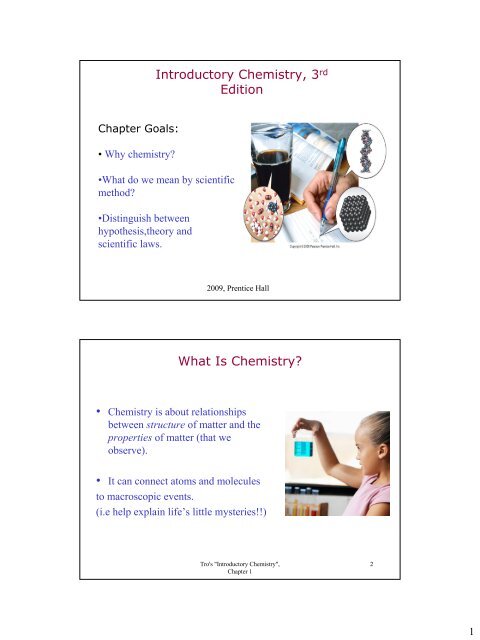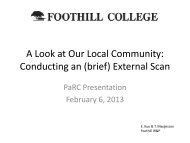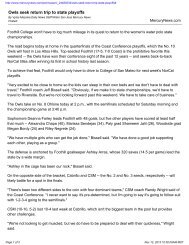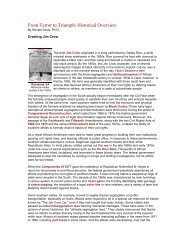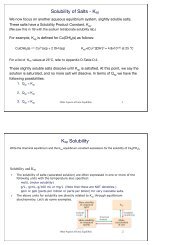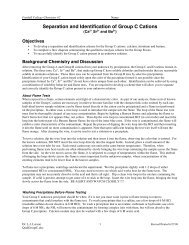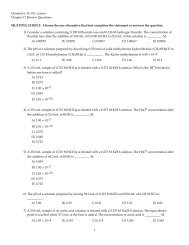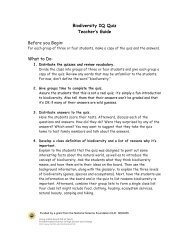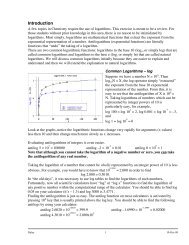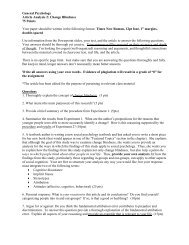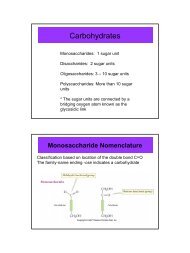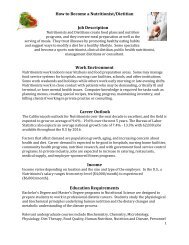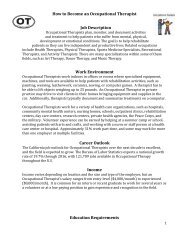Introductory Chemistry, 2nd Edition Nivaldo Tro
Introductory Chemistry, 2nd Edition Nivaldo Tro
Introductory Chemistry, 2nd Edition Nivaldo Tro
Create successful ePaper yourself
Turn your PDF publications into a flip-book with our unique Google optimized e-Paper software.
Chapter Goals:<br />
• Why chemistry?<br />
<strong>Introductory</strong> <strong>Chemistry</strong>, 3 rd<br />
<strong>Edition</strong><br />
•What do we mean by scientific<br />
method?<br />
•Distinguish between<br />
hypothesis,theory and<br />
scientific laws.<br />
2009, Prentice Hall<br />
What Is <strong>Chemistry</strong>?<br />
• <strong>Chemistry</strong> is about relationships<br />
between structure of matter and the<br />
properties of matter (that we<br />
observe).<br />
• It can connect atoms and molecules<br />
to macroscopic events.<br />
(i.e help explain life’s little mysteries!!)<br />
<strong>Tro</strong>'s "<strong>Introductory</strong> <strong>Chemistry</strong>",<br />
Chapter 1<br />
2<br />
1
Why <strong>Chemistry</strong>?<br />
•<strong>Chemistry</strong> is a core science! <strong>Chemistry</strong> and chemicals<br />
affect our daily lives in many different ways !<br />
• helps us understand current events<br />
from a technical perspective<br />
•Whether you want to become a -<br />
biologist,<br />
doctor,<br />
engineer,<br />
or other health science professions<br />
…chemistry will be at the core of your discipline!!<br />
• A process of trying to<br />
understand nature by<br />
observation, and by<br />
experiments to test our<br />
ideas.<br />
• Key characteristics of the<br />
scientific method include<br />
Observation,<br />
Hypotheses,<br />
Experiments, and<br />
formulation of Laws and<br />
Theories.<br />
<strong>Tro</strong>'s "<strong>Introductory</strong> <strong>Chemistry</strong>",<br />
Chapter 1<br />
The Scientific Method<br />
<strong>Tro</strong>'s "<strong>Introductory</strong> <strong>Chemistry</strong>",<br />
Chapter 1<br />
3<br />
4<br />
2
What is “Observation”?<br />
• Also known as Data.<br />
observations can compare a characteristic to a<br />
standard numerical scale.<br />
“A 240-mL serving of soda pop contains 27 g<br />
of sugar.” (this requires experimental<br />
data)<br />
observations can be a simple description<br />
“The soda pop is a liquid with a brown<br />
color and a sweet taste. Bubbles are seen<br />
floating up through it.”<br />
<strong>Tro</strong>'s "<strong>Introductory</strong> <strong>Chemistry</strong>",<br />
Chapter 1<br />
What we look for in a chemical<br />
Experiment…<br />
Quantitative information:<br />
numerical data (such as<br />
Temperature, melting<br />
points etc..)<br />
Qualitative information:<br />
non-numerical data (such<br />
as color, physical state<br />
such as solid or liquid<br />
etc..)<br />
<strong>Tro</strong>'s "<strong>Introductory</strong> <strong>Chemistry</strong>",<br />
Chapter 1<br />
5<br />
6<br />
3
What is a “Hypothesis”?<br />
• A tentative explanation of experimental observations.<br />
• Scientists perform more experiments to validate the hypothesis<br />
Note: A test may invalidate the hypothesis too!<br />
Even if a hypothesis is incorrect, it helps scientists approach<br />
A problem in a methodical and thorough manner!<br />
<strong>Tro</strong>'s "<strong>Introductory</strong> <strong>Chemistry</strong>",<br />
Chapter 1<br />
Law’s<br />
• Scientific laws are based on a vast amount of data, gathered<br />
by many investigators over a long period of time.<br />
• Scientific laws predict future observations but are subject to<br />
further experimentation and revision<br />
• May be stated as a mathematical relationship<br />
Examples:<br />
Law of Conservation of Mass— “In a chemical reaction matter<br />
is neither created nor destroyed.”<br />
Boyles law for gases: V & 1/P<br />
(Volume is inversely proportional to pressure when “number<br />
of moles” and temperature are constant)<br />
<strong>Tro</strong>'s "<strong>Introductory</strong> <strong>Chemistry</strong>",<br />
Chapter 1<br />
7<br />
8<br />
4
Theories<br />
• In science, a theory has to be supported by data<br />
• A good theory can be proven false, but it is very difficult<br />
to prove a theory to be true.<br />
• One difference between a law and a theory is:<br />
Laws never or rarely change, but theories can change and<br />
new hypothesis emerge as new facts are discovered.<br />
Examples: a) Newtons Law’s of gravity (explains how, but not<br />
why)<br />
b) Atomic Theory<br />
<strong>Tro</strong>'s "<strong>Introductory</strong> <strong>Chemistry</strong>",<br />
Chapter 1<br />
Practice<br />
1. A hypothesis is<br />
a description of a pattern or relationship in<br />
experimental data<br />
a tentative explanation for a natural<br />
phenomenon<br />
obeyed under any circumstances.<br />
a theory that has been proved<br />
2. The statement, "A chemical reaction never creates products that<br />
weigh more or less than the reactants", is based on three centuries<br />
of experimental observation. The statement is an example of:<br />
a. a theory b. a hypothesis c. a law d. a<br />
data<br />
<strong>Tro</strong>'s "<strong>Introductory</strong> <strong>Chemistry</strong>",<br />
Chapter 1<br />
9<br />
10<br />
5


